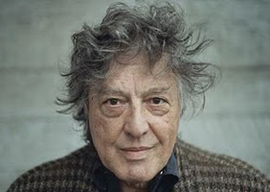
March 03, 2011

Sir Tom Stoppard
Stoppard isn”t being intentionally baffling, pretentious, or intimidating. He puts enormous effort into crafting his lines to be comprehensible. His stage directions genially offer various options to make his plays as simple as possible, but”as Einstein said of ideal scientific theories”no simpler. It’s just that Stoppard’s ambitions push the envelope of what human actors can feasibly communicate to human audiences.
Personally, to have a hope of grasping what’s happening onstage in a Stoppard play, I need to read it first. Even so, Hapgood, his 1988 espionage puzzle piece featuring a defecting Soviet physicist who, as an expert on Heisenberg’s Uncertainty Principle, unhelpfully points out to his MI5 handler that he may be a double, triple, quadruple, or quintuple agent, remained impenetrable.
That’s a lot to ask. Granted, a stage play is more readable than a screenplay, and Stoppard’s read better than his rivals”. But expecting people to order a Stoppard play from Amazon or to drop by a theatrical-specialty bookstore a couple of weeks before they see one of his plays is quite a time commitment.
Few are willing to make that commitment. Yet theater companies continue to bet that the Flynn Effect of rising average IQs will suddenly kick in with a vengeance between now and opening night.
How many of his plays have turned out right? On Broadway, the dazzling Rosencrantz ran for an impressive 420 performances in 1967-1968. In 1984-1985, The Real Thing, his first satisfyingly sentimental work, enjoyed 566 curtains in a famous production starring Glenn Close and Jeremy Irons. Broadway audience reactions to Stoppard’s other plays seem a bit more dutiful, however. Arcadia ran for 173 performances, Rock “n” Roll for 123, and the parts of The Coast of Utopia trilogy for 121.
Stoppard’s screenwriting provides more data. Only one movie he has cowritten, Shakespeare in Love, reached (just barely) the $100-million mark in US box office, and that after winning the Best Picture Oscar. The two greatest movies he’s gotten a credit on”Terry Gilliam’s Brazil and Steven Spielberg’s Empire of the Sun“were flops. Most of his other screenplays that have reached the screen”including adaptations of novels by Vladimir Nabokov, Graham Greene, John le Carré, E. L. Doctorow, and Robert Harris”have been forgotten.
Thus, the odds that Stoppard’s new version of Anna Karenina will prove a blockbuster seem slim. Yet we should appreciate that everybody keeps trying.